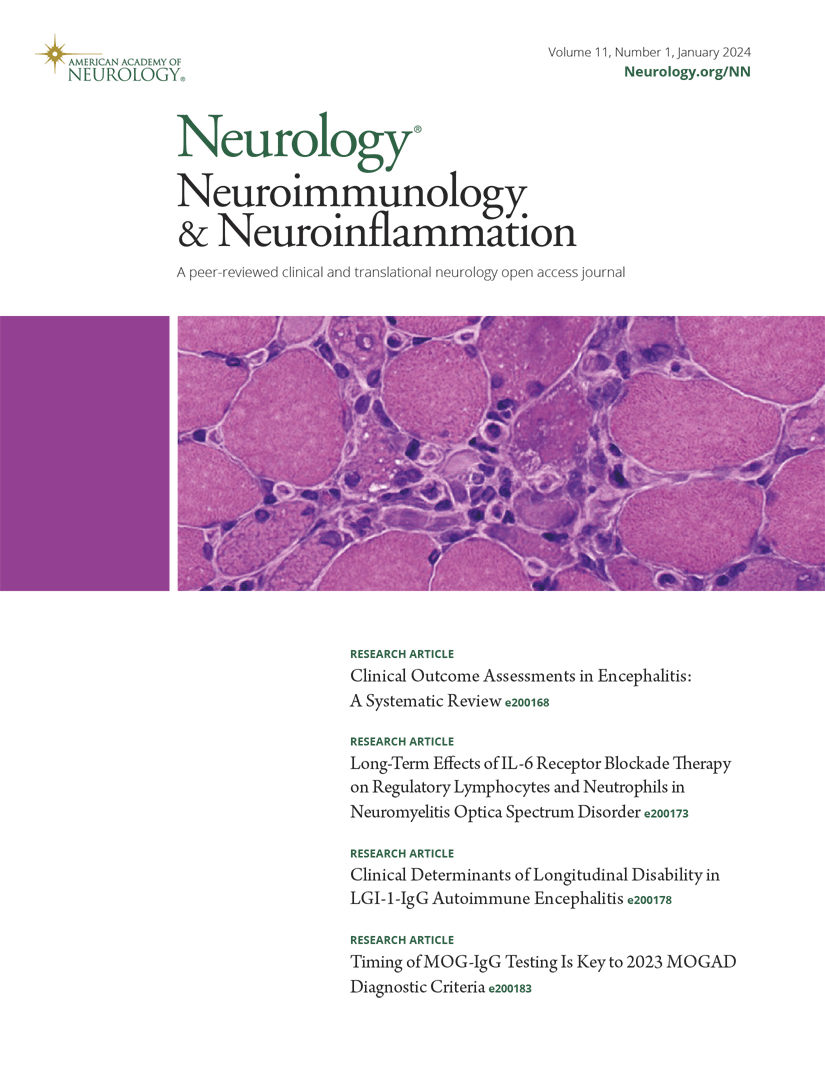胆钙化醇治疗复发-缓解型多发性硬化症:一项随机临床试验(CHOLINE)
IF 7.8
1区 医学
Q1 CLINICAL NEUROLOGY
Neurology® Neuroimmunology & Neuroinflammation
Pub Date : 2019-11-15
DOI:10.1212/NXI.0000000000000648
引用次数: 2
摘要
发表在2019年9月号《进行性多发性硬化症患者视网膜内核层、年龄和疾病活动性之间的关系》上的文章目的研究光学相干断层扫描评估的进行性多发病患者的内核层(INL)厚度是否因年龄和疾病活动性而异。方法回顾性纵向分析视网膜乳头周围神经纤维层(pRNFL)、神经节细胞层+内丛状层(GCIPL)、,在84名P-MS患者和36名性别和年龄匹配的健康对照组(HC)之间,以及根据年龄(截止年龄:51岁)和前12个月临床/MRI活动证据进行分层的患者之间,评估了INL和T1/T2病变体积(T1LV/T2LV)51岁以下患者的INL明显厚于老年患者和HCC(分别为38.2对36.5和36.7μm;p=0.038和p=0.04),并且在前12个月内出现MRI活动(新的T2/钆增强病变)的患者的INL明显厚于未出现MRI活动和HCC的患者(分别为39.5对36.4和36.7µm;p=0.003和p=0.008)。INL厚度越大,可以显著预测最近的MRI活动(Nagelkerke R 0.36,p=0.001)。结论具有最近MRI活动的年轻p-MS患者的INL厚度更高,这是先前研究中用于确定对疾病治疗反应最好的p-MS患者特定子集的标准。如果这一发现得到证实,我们认为INL厚度可能是目前和实验性治疗选择的P-MS患者分层的有用工具。本文章由计算机程序翻译,如有差异,请以英文原文为准。
Cholecalciferol in relapsing-remitting MS: A randomized clinical trial (CHOLINE)
Articles appearing in the September 2019 issue Relationship between retinal inner nuclear layer, age, and disease activity in progressive MS Objective To investigate whether inner nuclear layer (INL) thickness as assessed with optical coherence tomography differs between patients with progressive MS (P-MS) according to age and disease activity. Methods In this retrospective longitudinal analysis, differences in terms of peripapillary retinal nerve fiber layer (pRNFL), ganglion cell layer + inner plexiform layer (GCIPL), INL andT1/T2 lesion volumes (T1LV/T2LV)were assessed between 84 patients with P-MS and 36 sexand age-matched healthy controls (HCs) and between patients stratified according to age (cut-off: 51 years) and evidence of clinical/MRI activity in the previous 12 months Results pRNFL and GCIPL thickness were significantly lower in patients with P-MS than in HCs (p = 0.003 and p < 0.0001, respectively). INL was significantly thicker in patients aged <51 years compared to the older ones and HCs (38.2 vs 36.5 and 36.7 μm; p = 0.038 and p = 0.04, respectively) and in those who presented MRI activity (new T2/gadolinium-enhancing lesions) in the previous 12 months compared to the ones who did not and HCs (39.5 vs 36.4 and 36.7 μm; p = 0.003 and p = 0.008, respectively). Recent MRI activity was significantly predicted by greater INL thickness (Nagelkerke R 0.36, p = 0.001). Conclusions INL thickness was higher in younger patients with P-MS with recent MRI activity, a criterion used in previous studies to identify a specific subset of patients with P-MS who best responded to diseasemodifying treatment. If this finding is confirmed, we suggest that INL thickness might be a useful tool in stratification of patients with P-MS for current and experimental treatment choice.
求助全文
通过发布文献求助,成功后即可免费获取论文全文。
去求助
来源期刊

Neurology® Neuroimmunology & Neuroinflammation
Neuroscience-Neurology
CiteScore
15.60
自引率
2.30%
发文量
219
审稿时长
8 weeks
期刊介绍:
Neurology Neuroimmunology & Neuroinflammation is an official journal of the American Academy of Neurology. Neurology: Neuroimmunology & Neuroinflammation will be the premier peer-reviewed journal in neuroimmunology and neuroinflammation. This journal publishes rigorously peer-reviewed open-access reports of original research and in-depth reviews of topics in neuroimmunology & neuroinflammation, affecting the full range of neurologic diseases including (but not limited to) Alzheimer's disease, Parkinson's disease, ALS, tauopathy, and stroke; multiple sclerosis and NMO; inflammatory peripheral nerve and muscle disease, Guillain-Barré and myasthenia gravis; nervous system infection; paraneoplastic syndromes, noninfectious encephalitides and other antibody-mediated disorders; and psychiatric and neurodevelopmental disorders. Clinical trials, instructive case reports, and small case series will also be featured.
 求助内容:
求助内容: 应助结果提醒方式:
应助结果提醒方式:


